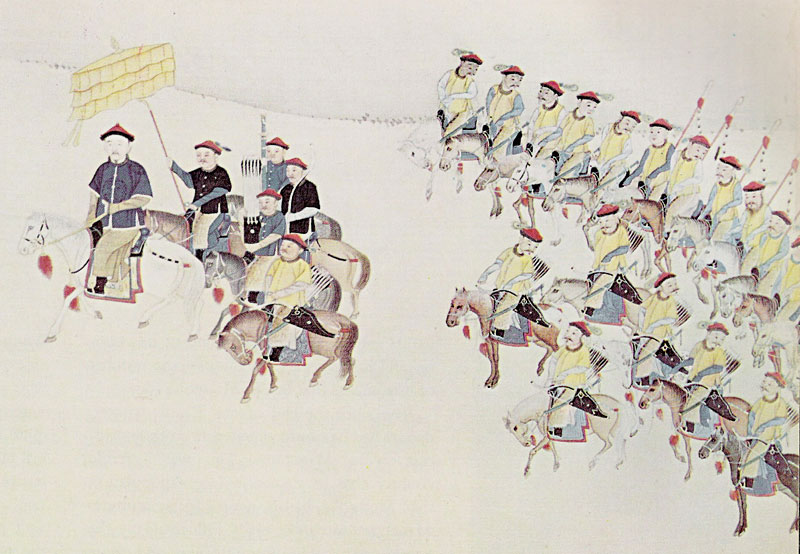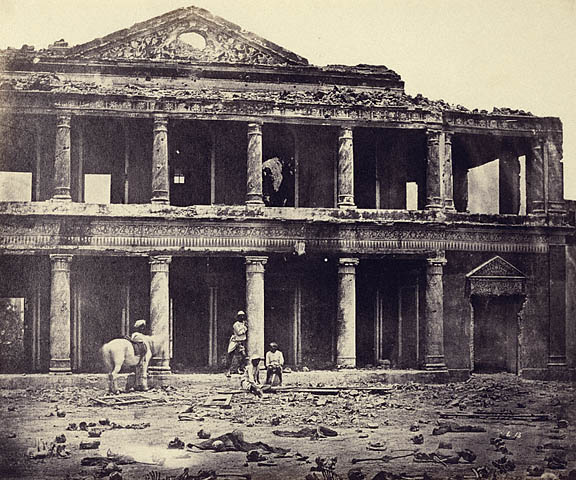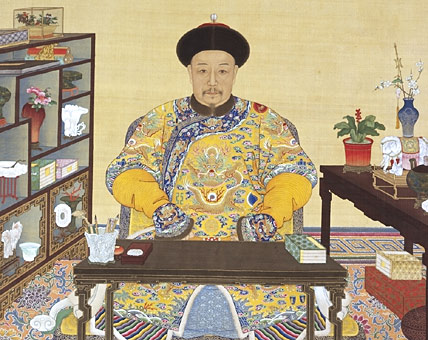|
Grand Council (Qing Dynasty)
The Grand Council or ''Junji Chu'' (; Manchu: ''coohai nashūn i ba''), officially the ''Banli Junji Shiwu Chu'' (), was an important policy-making body of China during the Qing dynasty. It was established in 1733 by the Yongzheng Emperor. The council was originally in charge of military affairs, but gradually attained a more important role and eventually attained the role of a privy council, eclipsing the Grand Secretariat in function and importance, which is why it has become known as the "Grand Council" in English. Despite its important role in the government, the Grand Council remained an informal policy making body in the inner court and its members held other concurrent posts in the Qing civil service. Originally, most of the officials serving in the Grand Council were Manchus, but gradually, Han Chinese officials were admitted into the ranks of the council. One of the earliest Han Chinese officials to serve in the council was Zhang Tingyu. The chancellery was housed i ... [...More Info...] [...Related Items...] OR: [Wikipedia] [Google] [Baidu] |
Jun Ji Chu
Jun or JUN may refer to: People and anthroponymy * Lee Jun-young, South Korean singer and actor with the stage name Jun, member of South Korean boy band U-KISS * Wen Junhui, Chinese singer and actor with the stage name Jun, member of South Korean boy band Seventeen * Tomáš Jun, Czech footballer * Jun (given name), a common Japanese given name * A spelling of common Korean family name Jeon (Korean surname) * A spelling of uncommon Korean family and given name Joon (Korean name) * A spelling of Chinese given name Joon (Chinese name) * Jun. Jr. or Jnr., abbreviations for Junior (suffix) Places * Jun, Granada, Spain Science * c-jun, a protein encoded by gene JUN Time * Abbreviation of June * A ten-day period in the Japanese calendar History * Commandery (China) A commandery ( zh, s=郡, p=jùn) was a historical administrative division of China that was in use from the Eastern Zhou (c. 7th century BCE) until the early Tang dynasty (c. 7th century CE). S ... [...More Info...] [...Related Items...] OR: [Wikipedia] [Google] [Baidu] |
Kangxi Emperor
The Kangxi Emperor (4 May 165420 December 1722), also known by his temple name Emperor Shengzu of Qing, personal name Xuanye, was the third emperor of the Qing dynasty, and the second Qing emperor to rule over China proper. His reign of 61 years makes him the longest-reigning emperor in Chinese history and one of the longest-reigning rulers in history. He is considered one of China's greatest emperors. The third son of the Shunzhi Emperor, Kangxi was enthroned at the age of seven while actual power was held for six more years by the four regents nominated by his father. After assuming personal rule, Kangxi's attempt to revoke the fiefdoms of feudal princes sparked the Revolt of the Three Feudatories, which he suppressed. He also forced the Kingdom of Tungning in Taiwan and Mongols in the north and northwest to submit to Qing rule, and launched an expedition that incorporated Tibet into the empire. Domestically, he initially welcomed the Jesuits and the propagation of ... [...More Info...] [...Related Items...] OR: [Wikipedia] [Google] [Baidu] |
Prince Gong (Qing Dynasty)
Yixin (11January 1833– 29May 1898), better known in English as PrinceGong or Kung, was an imperial prince of the Aisin Gioro clan and an important statesman of the Manchu-led Qing dynasty in China. He was a regent of the empire from 1861 to 1865 and wielded great influence at other times as well. He was one of the twelve iron cap princes of the Qing Dynasty. Yixin was a man of great talent, excelling in both literature and martial skills, and was among the most capable members of the imperial family. However, he was never favored by his father, the Daoguang Emperor, to succeed to the throne, which meant he spent his life in the role of a political aide rather than a ruler. In 1860, during the Second Opium War, when the British and French forces invaded Beijing, Yixin was entrusted with negotiating peace and signed the Treaty of Beijing on behalf of the Qing court. In 1861, after the death of his elder brother, the Xianfeng Emperor, Yixin, in collaboration with Empress Dowager ... [...More Info...] [...Related Items...] OR: [Wikipedia] [Google] [Baidu] |
Prince Regent
A prince regent or princess regent is a prince or princess who, due to their position in the line of succession, rules a monarchy as regent in the stead of a monarch, e.g., as a result of the sovereign's incapacity (minority or illness) or absence (e.g., by remoteness, such as exile or long voyage, or the absence of an incumbent). While the term itself can have the generic meaning and refer to any prince or princess who fills the role of regent, historically it has mainly been used to describe a small number of individual princes and princesses who were regents of non-principalities. Prince Regent of the United Kingdom In the English language the title ''Prince Regent'' is most commonly associated with George IV, who held the style His Royal Highness The Prince Regent during the Regency era due to the incapacity (by dint of mental illness) of his father, George III (see Regent for other regents). Regent's Park, Regent Street and Regent's Canal (which he commissioned) in ... [...More Info...] [...Related Items...] OR: [Wikipedia] [Google] [Baidu] |
Tongzhi Emperor
The Tongzhi Emperor (27 April 1856 – 12 January 1875), also known by his temple name Emperor Muzong of Qing, personal name Zaichun, was the ninth emperor of the Qing dynasty, and the eighth Qing emperor to rule over China proper. His reign, which effectively lasted through his adolescence, was largely overshadowed by the rule of Empress Dowager Cixi. Although he had little influence over state affairs, the events of his reign gave rise to what historians call the " Tongzhi Restoration", an unsuccessful modernization program. The only surviving son of the Xianfeng Emperor, he ascended the throne at the age of five under a regency headed by his biological mother Empress Dowager Cixi and his legal mother Empress Dowager Ci'an. The Self-Strengthening Movement, in which Qing officials pursued radical institutional reforms following the disasters of the Opium Wars and the Taiping Rebellion, began during his reign. The Tongzhi Emperor assumed personal rule over the Qing governme ... [...More Info...] [...Related Items...] OR: [Wikipedia] [Google] [Baidu] |
Empress Dowager Cixi
Empress Dowager Cixi ( ; 29 November 1835 – 15 November 1908) was a Manchu noblewoman of the Yehe Nara clan who effectively but periodically controlled the Chinese government in the late Qing dynasty as empress dowager and regent for almost 50 years, from 1861 until her death in 1908. Selected as a Concubinage in China, concubine of the Xianfeng Emperor in her adolescence, she gave birth to a son, Zaichun, in 1856. After the Xianfeng Emperor's death in 1861, his five-year-old son became the Tongzhi Emperor, and Cixi assumed the role of co-empress dowager alongside Xianfeng's widow, Empress Dowager Ci'an. Cixi ousted a group of regents appointed by the late emperor and assumed the regency along with Ci'an. Cixi then consolidated control over the dynasty when she installed her nephew as the Guangxu Emperor at the death of the Tongzhi Emperor in 1875. Ci'an continued as co-regent until her death in 1881. Cixi supervised the Tongzhi Restoration, a series of moderate reforms that hel ... [...More Info...] [...Related Items...] OR: [Wikipedia] [Google] [Baidu] |
Empress Dowager Ci'an
Empress Xiaozhenxian (12 August 1837 – 8 April 1881), of the Manchu Bordered Yellow Banner Niohuru clan, was a posthumous name bestowed to the wife and empress consort of Yizhu, the Xianfeng Emperor. She was empress consort of Qing from 1852 until her husband's death in 1861, after which she was honored as Empress Dowager Ci'an. As empress dowager and one of the most senior members of the imperial family, she and Empress Dowager Cixi became co-regents during the reign of two young emperors: Zaichun, the Tongzhi Emperor and later Zaitian, the Guangxu Emperor. Although in principle, she had precedence over Cixi, Ci'an was in fact a self-effacing person and seldom intervened in politics, but she was the decision-maker in most family affairs. Instead, Empress Dowager Cixi was the decision-maker in most state affairs. A popular view of Empress Dowager Ci'an is that she was a highly respectable person, always quiet, never hot-tempered, and that she treated everybody very wel ... [...More Info...] [...Related Items...] OR: [Wikipedia] [Google] [Baidu] |
Felice Beato (British, Born Italy - Portrait Of Prince Kung, Brother Of The Emperor Of China, Who Signed The Treaty - Google Art Project
Felice Beato (c. 1832 – 29 January 1909), also known as Felix Beato, was an Italian–British photographer. He was one of the first people to take photographs in East Asia and one of the first war photographers. He is noted for his genre works, portraits, and views and panoramas of the architecture and landscapes of Asia and the Mediterranean region. Beato's travels gave him opportunities to create images of countries, people, and events that were unfamiliar and remote to most people in Europe and North America. His work provides images of such events as the Indian Rebellion of 1857 and the Second Opium War, and represents the first substantial body of photojournalism. He influenced other photographers; and his impact in Japan, where he taught and worked with numerous other photographers and artists, was particularly deep and lasting. Early life and identity A death certificate discovered in 2009 states that Beato was born in Venice in 1832. It also indicates that he was a Br ... [...More Info...] [...Related Items...] OR: [Wikipedia] [Google] [Baidu] |
Heshen
Heshen (; ; 1 July 1750 – 22 February 1799) of the Manchu Niohuru clan, was an official of the Qing dynasty. Favored by the Qianlong Emperor, he was described as the most corrupt official in Chinese history, having acquired an estimated 1.1 billion taels of silver, equal to roughly US$270 billion, during his career. After the death of Qianlong, the Jiaqing Emperor confiscated Heshen's wealth and forced him to commit suicide. Heshen is remembered as one of the richest men in history. Born Shanbao (Shan-pao; ), his name was later changed to Heshen. His courtesy name was Zhizhai (Chih-chai; ). He was a member of the Plain Red Banner. Ascendance Heshen was the son of a Manchu military officer and studied at a school for Manchu aristocratic boys. He lost his mother when he was young and it was said he and his younger brother had a hard life under his stepmother. However, Heshen was an excellent student, knowing Middle Mandarin, Manchu, Mongolian and Tibetan. In 1772, he beg ... [...More Info...] [...Related Items...] OR: [Wikipedia] [Google] [Baidu] |
Favourite
A favourite was the intimate companion of a ruler or other important person. In Post-classical Europe, post-classical and Early modern Europe, early-modern Europe, among other times and places, the term was used of individuals delegated significant political power by a ruler. It was especially a phenomenon of the 16th century, 16th and 17th century, 17th centuries, when government had become too complex for many hereditary rulers with no great interest in or talent for it, and political institutions were still evolving. From 1600 to 1660 there were particular successions of all-powerful minister-favourites in much of Europe, particularly in Spain, England, France and Sweden. By the late 17th century, the royal favourite as quasi-Prime minister, Prime Minister declined; in France, the King resolved to Absolutism (European history), rule directly, while in Britain, as the power of the monarch relative to Parliament of the United Kingdom, Parliament declined, executive power slowly ... [...More Info...] [...Related Items...] OR: [Wikipedia] [Google] [Baidu] |
Jiaqing Emperor
The Jiaqing Emperor (13 November 1760 – 2 September 1820), also known by his temple name Emperor Renzong of Qing, personal name Yongyan, was the sixth emperor of the Qing dynasty and the fifth Qing emperor to rule over China proper. He was the 15th son of the Qianlong Emperor. During his reign, he prosecuted Heshen, the corrupt favorite of his father and attempted to restore order within the empire while curbing the smuggling of opium into China. Assessments of his reign are mixed, either seen as the "beginning of the end" of the Qing dynasty, or as a period of moderate reform that presaged the intellectual movements of the 1860s. Early years Yongyan was born in the Old Summer Palace, 8 km (5 mi) northwest of the walls of Beijing. His personal name, "Yongyan" (永琰), was later changed to "Yongyan" (顒琰) when he became the emperor. The Chinese character for ''yong'' in his name was changed from the more common 永 to the less common 顒. This novelty was ... [...More Info...] [...Related Items...] OR: [Wikipedia] [Google] [Baidu] |
Qianlong Emperor
The Qianlong Emperor (25 September 17117 February 1799), also known by his temple name Emperor Gaozong of Qing, personal name Hongli, was the fifth Emperor of China, emperor of the Qing dynasty and the fourth Qing emperor to rule over China proper. He reigned officially from 1735 until his abdication in 1796, but retained ultimate power subsequently until his death in 1799, making him one of the longest-reigning monarchs in history as well as one of the longest-lived. The fourth and favourite son of the Yongzheng Emperor, Qianlong ascended the throne in 1735. A highly ambitious military leader, he led Ten Great Campaigns, a series of campaigns into Inner Asia, Burma, Nepal and Vietnam and suppressed rebellions in Jinchuan County, Jinchuan and Taiwan. During his lifetime, he was given the deified title Emperor Manjushri by the Qing's Tibetan subjects. Domestically, Qianlong was a major patron of the arts as well as a prolific writer. He sponsored the compilation of the ''Siku Qu ... [...More Info...] [...Related Items...] OR: [Wikipedia] [Google] [Baidu] |



